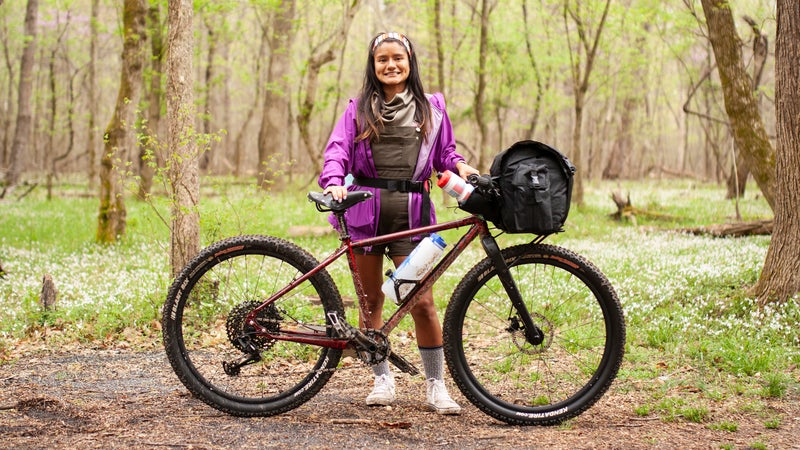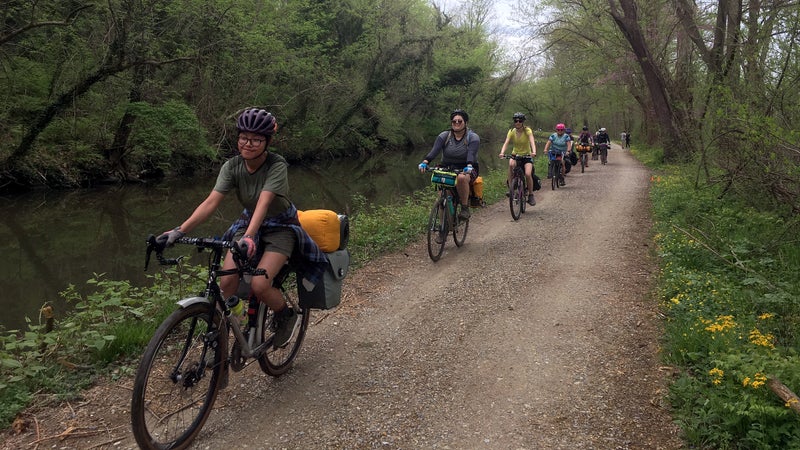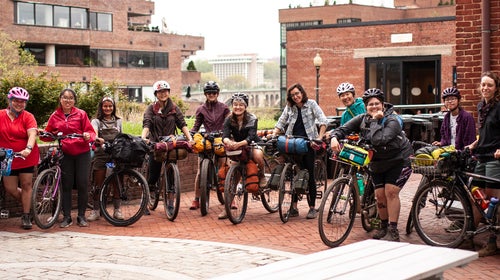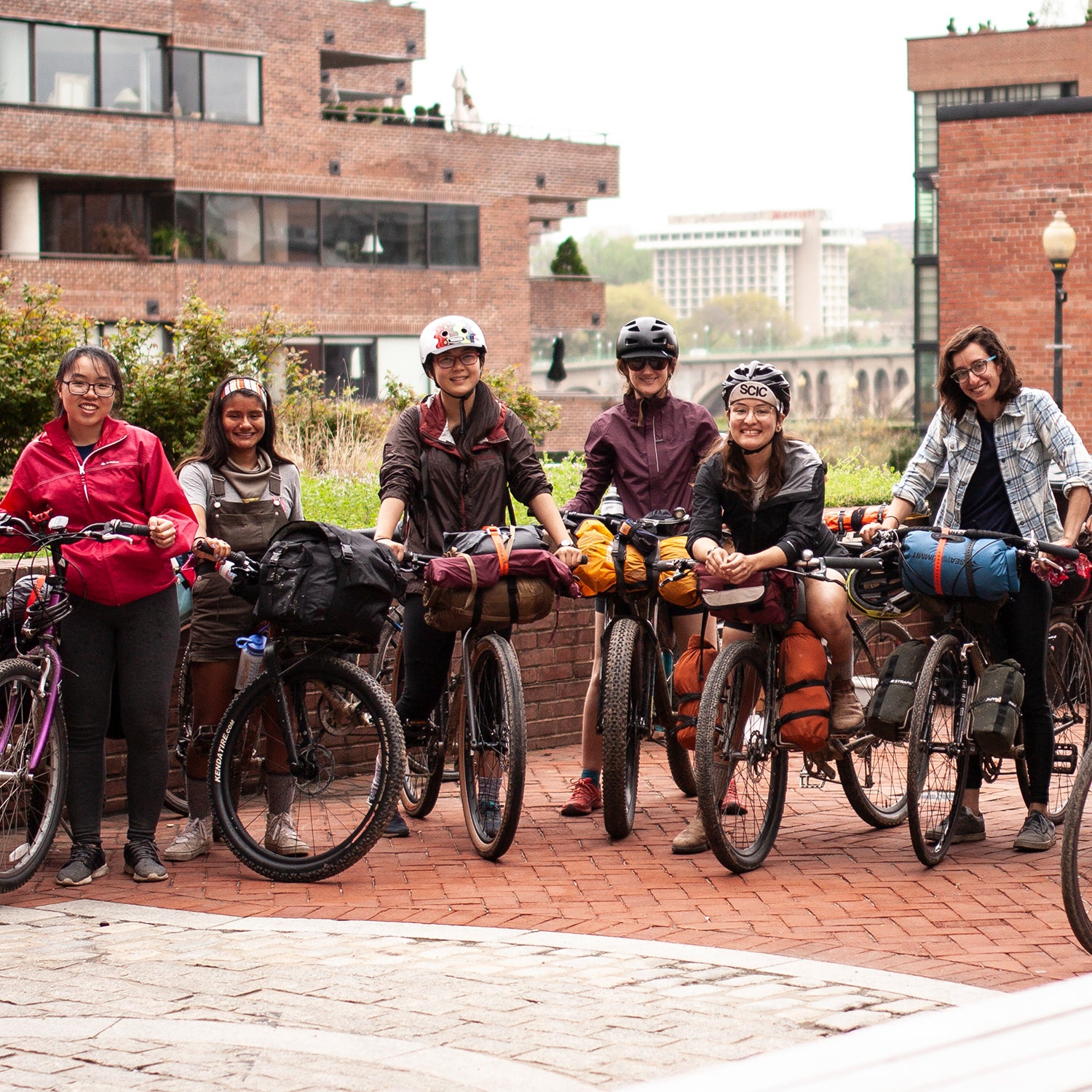Last August, a group of about 100 cyclists convened in Whitefish, Montana, for a four-day summit on bike exploring, a loosely defined sport that encompasses any cycling that takes the rider out into nature. What made the event unique wasn’t its size or location, but who was there—or, rather,��who was not there. Among the attendees, panelists, speakers, and organizers, there was not a single cisgender man.
The event was put on by , founded in 2018 to help create space for women, trans, femme, nonbinary, and genderqueer cyclists in the world of bike exploring. The summit, which will be held for the��second time this August, features panels and opportunities to share knowledge about topics like hygiene, traveling safely, and bike repair. And it’s all aimed at people who might feel excluded from dominant cycling culture. WTF��has gained fans around the world, spawned regional groups inspired by its inclusive ethos, and created a ripple effect of activism around access to cycling.
There are as many��social barriers in cycling as there are in society at large: socio-economic concerns, racial exclusion, gender discrimination, differences of language. In many cases, these barriers aren’t necessarily set up maliciously, but many of the people I spoke with��talked about being dismissed by cis men or not seeing themselves represented in bicycling culture. “Cycling can be a very exclusive space. To get into it without having the knowledge and skill can be kind of intimidating,” says cofounder Tenzin Namdol (who goes by “Nam”), a sentiment echoed by organizers and participants. “The mood is different when you have more women or femme people present.”
It’s not just like a men-not-allowed��club. Cis men are making it really hard for us to be excellent, so we’re going to take that little thing out so we can be excellent.
After having many conversations about the ways in which cis men made them feel less than in the biking community, Nam, along with��like-minded cyclists Jocelyn Gaudi Quarrell, Mary Lytle, Molly Sugar, Sarah Swallow, and Whitney Ford-Terry—decided to take matters into their own hands by founding WTF in the fall of 2017��and hosting rides starting in April 2018. While they’ve organized the summit as a national entity, Nam explains that��WTF encourages others to start up local groups, offering initial coordination or providing guidance. It’s hard to guess the exact number of riders that are organizing under the WTF banner, but its website currently shows eight upcoming rides taking place on routes all over the country, as well as in Canada, Australia, and the UK.��When WTF first put out a call for people to organize rides in their own communities, Nam says around 50 people expressed interest. Some regional groups now offer workshops and rides, while others hold presentations��and��additional opportunities to get together with other interested riders. “The imagination of this even existing was lacking before,” she says. “Because it’s there now, there are so many ways people could take it from here.”
On a soggy April afternoon, I joined , which operates in the Baltimore–Washington, D.C., area, for an overnight group ride on the C&O Canal. Cofounder Kimberly Wiman first heard about WTF on , where the group’s hashtag, #ShredthePatriarchy, has been used almost 3,500 times. Wiman took part in WTF’s ride series in Arizona and Montana��and found the experience transformational. “Those trips were some of the most rejuvenating, powerful experiences I’d ever had on a bike,” she says. She and her friend Danielle Parnes noted��that most of the WTF founders were based on the West Coast, so they decided to bring it out east in 2018.
Many of the 15 women in our group had never been bikepacking; some wanted a chance to try it out ahead of larger planned trips��or just get a sense of whether they wanted to make this part of their cycling routine. Almost everyone—myself included—had borrowed gear, randomly assembled camping equipment, and in many cases felt��anxious��about whether or not they’d be doing things the right way. Wiman and Parnes build those concerns into their planning process; they connect with participants one-on-one��to answer questions and make sure they have what they need, and they host community-building workshops ahead of trips.
Angelica Casaverde, who owns the�� clothing��brand��and runs�� with her husband, had come from New Jersey for the ride. She says that the experience of riding is different “being in a nonjudgmental��safe zone with people who are femme and of color. We all have common ground, and working off of that and supporting each other in a white, male-dominated sport eases the fears.”

On the trail, women asked for help when they needed it, gave each other space to try things, like putting up a tent or working with a mini burner, without swooping in to help before asked, and learned from one another in encouraging ways, anything from riding experiences to campsite-dinner recipes. They took pictures of each others’ gear and tested each others’ bikes to see what they might want to try in the future.
“Because I was a beginner, I wasn’t sure what the group would be like and if I would feel out of place due to my being inexperienced,” says Julie Sims, a senior auditor who lives in Silver Spring, Maryland. Sims has since gone out for another overnight with a friend who was also on the ride, and the two are planning a bikepacking trip��from San Francisco to Los Angeles.
Nam, Parnes, and Wiman��emphasize that part of the goal of WTF is ensuring that people gain the skills they need to feel comfortable going out on their own or organizing��rides. “We’re building a strong community of WTFs from different backgrounds through this, which results in more people having access to biking and to the outdoors,” Parnes says. “But the amplifying effect of that is that we create this supportive network of more confident, driven, and self-reliant WTFs when we’re back in our own communities, jobs, and families, trying to address issues every day.”
“It’s not just like a men-not-allowed��club,” Nam says. “Cis men are making it really hard for us to be excellent, so we’re going to take that little thing out so we can be excellent.”
In that way, WTF is a starting point for a larger shift that’s already starting to take place in some corners��of bicycling culture.
“They are facilitating something I have always felt I wanted and needed,” says Ryann Giorgi, an apprentice at . The employee-owned shop partnered with Parnes and Wiman early on to��host��WTF workshops, and it offers a discount program for riders. Giorgi, who is gender nonconforming, is currently introducing a series of workshops during which non-cis-men cyclists can practice maintenance on their bikes without a male presence. They see it as a way of continuing the work started by WTF in the Baltimore community. “You have a group of people who are focused on not making you feel different or stupid��and are focused on being empowering.”

The second WTF , which will take place August 15 to 18 in Vernonia, Oregon, has much to live up to. Nam says the first summit was an emotional experience, in part because of the “abundance”—of information, experience, love for cycling, and the desire to lift one another up. “People were doing this because they love what they do and they want to see it grow into something that is also loving, outside of a competition mindset,” she says.
This year’s theme is justice and healing. The balance of hands-on practical advice and social-justice activism speaks to the way WTF sees its mission: equal parts sharing knowledge and forging an inclusive, sustainable community. And the response has shown that it’s a mission that resonates; when tickets were released on May 1, they sold out��within a few hours.
Both nationally and regionally, the WTF groups are looking for ways to expand on their connected missions. For WTF Mid-Atlantic, that means continuing to plan more rides at various experience levels and buying gear it��can lend to participants. WTF is also planning an ambassador program designed to bring rides to more communities. But along with concrete expansion comes a lot of listening.
“There aren’t enough voices at the table right now, so we’re looking to the leadership of other people, other riders who have multiple marginalities that keep them from feeling safe and good on a bike outside,” Nam says. “There’s been an outpouring of expectations for what WTF can or should be, and that is what we’re trying to iron out. At the core of everything we do, it’s about celebration and connection through bike explorations.”


